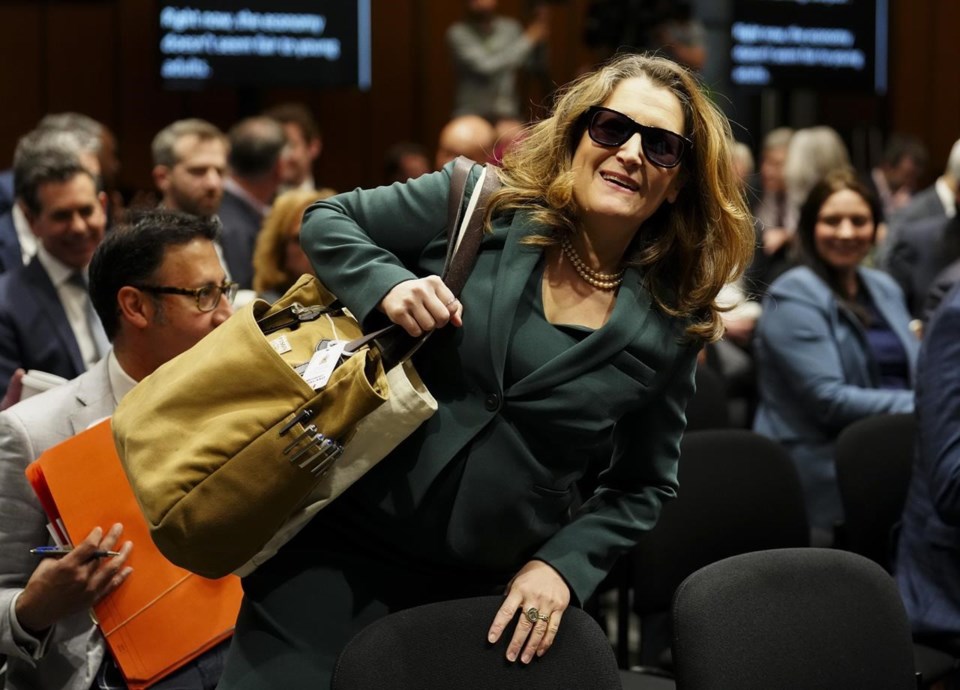TORONTO — The federal budget is being met with disdain from Canada's innovation industry, including tech darling Shopify, which called the capital gains measures in the fiscal plan a potential cause of "irreparable harm."
The sector is disappointed that the Liberal government's budget tabled Tuesday includes a proposed increase to the proportion of capital gain earnings on which businesses pay income tax, to two-thirds from one half.
The hike would also be applied to individuals for capital gains earnings above $250,000 in a year.
It said the increase would only impact the wealthiest 0.13 per cent and result in $19.3 billion in revenue over the next five years. However, the proposal was met with dismay from the tech industry, which derided the changes.
"My phone was exploding with texts from leaders across the country saying, 'This is a nightmare. You have to fix this. They don't know what they're doing,'" Benjamin Bergen, president of the Council of Canadian Innovators industry group, said Wednesday.
At the crux of the complaints he fielded was a feeling that the potential changes would encourage entrepreneurs to open their businesses elsewhere and push workers in the sector away from Canada as they try to avoid paying more tax when cashing in on stock options.
"If taxation and capital gains are so punitive that it doesn't make sense for either someone to stay in the country or choose to leave maybe a more traditional job to go and ... build a new company, you're depriving (the country) of the talent that it needs," Bergen said.
Eighty per cent of 500 businesses consulting firm KPMG surveyed in 2021 said they needed more workers with digital skills, but two-thirds were having trouble finding and hiring such talent. The report was releasedbefore artificial intelligence began booming in the wake of ChatGPT's release in 2022, which has only heightened demand for tech talent.
While capital gains measures are seen as a way to tax the wealthiest, Bergen said what's in the budget could affect tech workers who aren't in senior positions.
"Those folks who join startups and scaleups as they're beginning their journey are provided stock options and other benefits, which are ultimately determined as capital gains in the future," he said.
"It's marketing experts, sales experts, legal experts that are traditionally mid-career that ... you're completely undermining by this type of policy lever that's being implemented."
CCI drafted an open letter to Prime Minister Justin Trudeau and Finance Minister Chrystia Freeland urging them to scrap the tax. By early Wednesday evening, leaders from 200 companies had signed the letter.
In response to the criticism, Freeland's office said it pursued capital gains changes to create fairness for younger Canadians who are struggling with the cost of living.
The budget also included a new program that lowers how much tax some small business owners pay when selling their companies. Those who qualify will be taxed on only one-third of their capital gains up to $2 million.
Several Shopify Inc. executives, including president Harley Finkelstein, posted about the capital gains changes Freeland proposed on X. Hours after the budget's release, he wrote, "What. Are. We. Doing?!?"
"This is not a wealth tax, it's a tax on innovation and risk taking," he added on Wednesday.
"Our policy failures are America's gains."
The Ottawa-based e-commerce giant's chief executive Tobi Lütke also chimed in, saying a friend had messaged him to say, "Canada has heard rumours about innovation and is determined to leave no stone unturned in deterring it."
Forbes estimates Lütke's net worth is valued at US$6.4 billion. While he's been more vocal in his criticism of the federal government's policy decisions in recent months, he previously chaired a digital strategy table that convened in 2018 and hosted Trudeau at his company's conference.
Meanwhile, the head of the Canadian Venture Capital and Private Equity Association said on LinkedIn the capital gains changes left her feeling "baffled."
"This measure, which effectively taxes innovation and risk-taking, will significantly dampen Canada's entrepreneurial spirit, stifle economic growth in critical sectors of our economy, and impact job creation," Kim Furlong said.
"Such (a) policy change undermines Canada's position to attract the talent needed to grow and scale companies here."
Furlong promised to "work tirelessly to reverse the decision."
Alison Nankivell, chief executive of the MaRS innovation hub in Toronto, took such reaction to the budget to be a reflection of the tug of war that can pit fairness against economic opportunity.
"In some ways, what you're hearing from the entrepreneur community is a feeling that that balance is maybe not where they want it to be in terms of the ability to build a business," she said.
The tension masked some of the benefits for the sector she saw in the budget.
For example, the government set aside $2.4 billion to boost AI capacity with the bulk dedicated to a fund that would increase access to computing and technical infrastructure.
Nankivell was "really glad" AI was given some attention because she said Canada has to be considering whether it has enough capacity in chips and server farms to power the technology’s future uses.
Money was also allocated toward a program that sees Ottawa work with the private market to co-invest in promising Canadian companies, setting up the Financial Consumer Agency of Canada to oversee opening banking and shaping the country’s approach to cryptocurrency asset reporting.
This report by The Canadian Press was first published April 17, 2024.
Tara Deschamps, The Canadian Press



